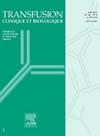供体/受体rh部分匹配的异体造血干细胞移植后输血策略和对红细胞抗原的同种免疫。
IF 1.2
4区 医学
Q4 HEMATOLOGY
引用次数: 0
摘要
背景:同种异体造血干细胞移植(alloHSCT)后,HAS建议输入与Rh(“恒河猴”)表型匹配的红细胞(rbc), EFS建议同时考虑供体和受体Rh表型。我们之前报道了58例Rh不相容的同种异体造血移植受者的10.3%的同种免疫接种率:没有一个是针对不匹配的供体Rh抗原的。研究设计和方法:在这项单中心回顾性研究中,我们调查了264例部分供体/受体Rh匹配的异体造血干细胞移植后第一年对红细胞抗原的同种异体免疫的发生率,这些患者输注的同种异体造血干细胞的红细胞至少表达受体缺失的一种供体Rh抗原。结果:6例患者红细胞抗体筛查阳性(异体免疫率2.3%)。在5个病例中,抗体与输血策略无关。1例患者出现暂时性抗c抗体,可能与输血策略有关,发生在免疫性溶血性贫血的背景下。讨论:我们的研究结果表明,供体Rh表型的红细胞输注与红细胞抗原免疫率低有关。这些结果质疑了当前同种异体造血干细胞移植受者的输血指南,旨在限制使用供应短缺的红细胞表型。本文章由计算机程序翻译,如有差异,请以英文原文为准。
Transfusion strategy and allo-immunization to red blood cell antigens after allogeneic hematopoietic stem cell transplantation with partial donor/recipient Rh matching
Background
After allogeneic hematopoietic stem cell transplantation (alloHSCT), the HAS recommends transfusing red blood cells (RBCs) matched for Rh (“Rhesus”) phenotypes, and the EFS recommends respecting both donor and recipient Rh phenotypes. We previously reported a 10.3% allo-immunization rate in 58 Rh-incompatible alloHSCT recipients transfused in the donor phenotype: none was directed against the mismatched donor Rh antigens.
Study design and methods
In this single-center retrospective study, we investigated the incidence of allo-immunization to RBC antigens during the first year after alloHSCT in 264 patients with partial donor/recipient Rh matching, and transfused from alloHSCT with RBCs expressing at least one donor Rh antigen absent from the recipient.
Results
Six patients had a positive RBC antibody screening test (allo-immunization rate: 2.3%). In five cases, the antibodies were unrelated to the transfusion strategy. One patient presented a temporary anti-C, possibly related to the transfusion strategy, occurring in a context of immune hemolytic anemia.
Discussion
Our findings indicate that the transfusion of RBC in the donor Rh phenotype is associated with a low rate of immunization to RBC antigens. These results question the current transfusion guidelines in alloHSCT recipients, aiming to limit the use of short-supply RBCs phenotypes.
求助全文
通过发布文献求助,成功后即可免费获取论文全文。
去求助
来源期刊
CiteScore
2.50
自引率
11.80%
发文量
234
审稿时长
36 days
期刊介绍:
Transfusion Clinique et Biologique, the official journal of the French Society of Blood Transfusion (SFTS):
- an aid to training, at a European level
- the only French journal indexed in the hematology and immunology sections of Current Contents
Transfusion Clinique et Biologique spans fundamental research and everyday practice, with articles coming from both sides. Articles, reviews, case reports, letters to the editor and editorials are published in 4 editions a year, in French or in English, covering all scientific and medical aspects of transfusion: immunology, hematology, infectious diseases, genetics, molecular biology, etc. And finally, a convivial cross-disciplinary section on training and information offers practical updates.
Readership:
"Transfusers" are many and various: anesthetists, biologists, hematologists, and blood-bank, ICU and mobile emergency specialists...

 求助内容:
求助内容: 应助结果提醒方式:
应助结果提醒方式:


